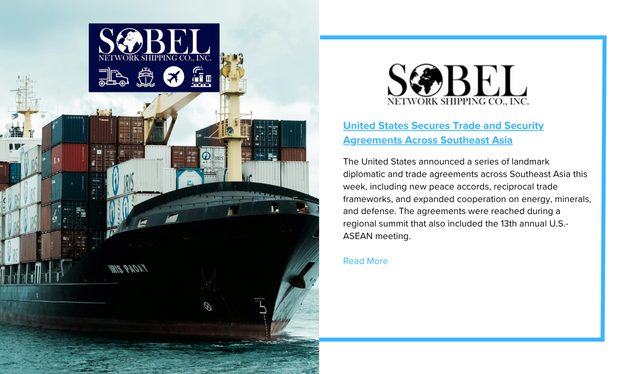The United States announced a series of landmark diplomatic and trade agreements across Southeast Asia this week, including new peace accords, reciprocal trade frameworks, and expanded cooperation on energy, minerals, and defense. The agreements were reached during a regional summit that also included the 13th annual U.S.-ASEAN meeting.
Regional Peace and Stability
A major development from the summit was the signing of the Kuala Lumpur Peace Accords between Thailand and Cambodia, aimed at resolving longstanding border tensions and enhancing regional stability. The agreement establishes joint border observer teams and includes humanitarian measures such as the release of detained personnel. Observers called it a milestone for Southeast Asian diplomacy and a potential model for future conflict resolution efforts.
Trade and Economic Partnerships
The United States signed reciprocal trade agreements with Malaysia and Cambodia and announced frameworks for future trade talks with Thailand and Vietnam. The new deals are designed to expand market access for U.S. agricultural and industrial goods while removing tariff and non-tariff barriers across multiple sectors.
Under the Malaysia agreement, the country will lower or eliminate tariffs on nearly all U.S. exports and recognize U.S. regulatory standards for vehicles and agricultural products. The Cambodia deal goes further, removing all duties on U.S. imports and ensuring fair treatment for American exporters.
New frameworks with Thailand and Vietnam will lay the groundwork for tariff reductions on nearly all traded goods, fostering balanced and transparent trade relations.
Energy, Minerals, and Technology Cooperation
The U.S. and Malaysia also signed a Memorandum of Understanding (MOU) on critical minerals, covering exploration, extraction, refining, and recycling. The initiative aims to diversify global mineral supply chains and strengthen resilience in strategic industries.
The two countries also announced a range of commercial and energy deals, including multi-year liquefied natural gas (LNG) and coal purchase agreements, new investments in aerospace and telecommunications, and commitments totaling more than $150 billion in U.S. exports of semiconductors and advanced technology components.
The bilateral relationship has now been elevated to a Comprehensive Strategic Partnership, accompanied by a new MOU on maritime security and domain awareness.
Strengthening Regional Defense Cooperation
The United States and Cambodia agreed to expand defense collaboration, including the resumption of the ANGKOR SENTINEL joint exercise and new educational opportunities for Cambodian officers at U.S. military academies. The two countries also outlined cooperation to combat transnational crimes such as drug trafficking and large-scale online fraud operations.
Similarly, the U.S. and Thailand signed an MOU to promote critical minerals partnerships and supply chain resilience, emphasizing fair competition and responsible production standards. The agreement also strengthens joint efforts on cyber and financial crime investigations.
A Regional Turning Point
Collectively, these agreements mark a deepening of U.S. engagement in Southeast Asia through a blend of trade liberalization, security cooperation, and energy development. Officials from participating nations characterized the summit as a pivotal step toward greater regional stability, open markets, and long-term strategic balance in the Indo-Pacific region.


